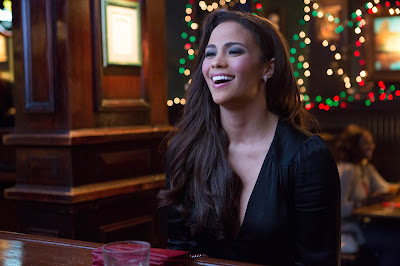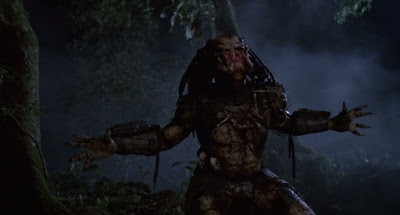Man I've been really, really excited about this one - probably too excited, considering the trailers - but ever since the first casting announcements, this project has become the first of my 'must-sees' for 2017.
I can sadly admit that I have seen
every single Universal Mummy movie. Most of them are very bad, or just plain boring. So, unlike the other Universal Monsters, I don't have a problem with having another go at the Mummy -- it's the kind of interesting concept that deserves a re-do (look, the 1999
Mummy is
a lot of fun, but I don't think anyone is going to claim it as an all-time classic). I'm still not sold on the whole shared universe thing (remember the days when people used to focus on making one good movie?), but it seemed if Tom Cruise was into it, the material must be at least decent -- and Sofia Boutella is a badass, so I knew this at least had a shot at being fun.
A few things gave me pause going in: One, as already stated, this shared Universal Monsters franchise sounds like a mess waiting to happen. And Two, the helmer behind this Mummy is Alex Kurtzman, who has only one previous directorial credit (the okay drama
People Like Us) and his work as screenwriter is pretty mixed (a few too many
Transformers movies. And the last
Spider-Man movie. And
Star Trek 2-Wrath of Plot Holes). Still, it's not like they had Skip Woods and Brett Ratner double-teaming this one. Maybe shorn of Roberto Orci, and with different collaborators, he could rise to the challenge of making a great, fun monster movie with Tom Cruise and Gazelle from
Kingsman. Because that still sounds cool.
Enough rambling. On with the review!
Cruise plays Nick Morton, a soldier/part-time black market scavenger, who has a nice sideline in swiping ancient artefacts and selling them off. Currently on tour in Iraq, he goes AWOL when he hears there might be some treasure under a town in hostile territory. Instead of treasure, Nick discovers the tomb of Egyptian princess Ahmanet (Sofia Boutella). Buried alive after she tried to murder her way to the throne she had been denied, she is now free to enact her revenge. If this wasn't bad enough, she
really needs Nick's help to get her plans underway. Zoinks!
When
The Mummy aims for comedy, it is a joy. When it aims for anything else, it is Gene Wilder's character from
Blazing Saddles: all over the place.
The main problem is the underlying theme of the movie, which is to give Universal a piece of the 'shared universe' pie that every other major studio is craving. The problem with this approach is that it means the this movie has no reason to exist dramatically. Every character and every scene is designed to shove this movie toward a bunch of sequels and spinoffs, rather than a narrative conclusion that will (hypothetically) make people want to see this movie on its own terms.
Call me old-fashioned, but it's a quality I miss.
What is sad is that the movie had six writers, including Jenny Lumet (
Rachel Getting Married), David Koepp (
Jurassic Park) and Cruise's Mission: Impossible collaborator Christopher McQuarrie (who also wrote a little movie called
The Usual Suspects). Throughout the movie you can see the struggle going on between the corporate and creative sides, as the story and the characters struggle to maintain any kind of internal coherence.
It would help if the direction was more inspired. The movie aims for scares and tension, but director Alex Kurtzman has no feel for the scenario's pulpier elements, failing to give any of the movie's signature moments a sense of real impact. As a blockbuster, this one of the most generic in recent memory, from its colour palette to its use of CG.
And despite the big budget, the movie feels weirdly small and compartmentalised. The sets are never shot with a sense of scale, and always feel like sets. Aside from the opening scenes in Iraq, the movie is basically stuck indoors. It never feels like there is a world outside of what we can see.
Speaking of tunnel vision, the 'Dark Universe' set-up which is supposed to get us to movies about Frankenstein's Monster, Dracula and the Creature from the Black Lagoon is dull and pointless - it would help if it was fun, but it just comes off as rote and poorly developed. It also takes up the majority of the movie's second act, sucking attention away from the main story.
This movie has some of the worst exposition dumps I've seen in recent years. The movie opens with a flashback to set up the Mummy, which is fine. But then thirty minutes later Annabelle Wallis repeats the same story, complete with cutaways to this scene which we've already seen. And that's not the only exposition dump - there's like ten scattered throughout the movie.
Russell Crowe has fun as Dr Jekyll and Mr Hyde, but he could be cut out and you would not miss him. When Hyde appears it looks like the movie might actually go somewhere interesting: Unlike his good half, Hyde wants to become the Mummy's partner, and help her destroy the world, just for the hell of it. It's a great idea, but Hyde is quickly subdued and you never hear anything else about it. As I said, pointless.
Speaking of pointless, the writers never figure out who Annabelle Wallis's character is supposed to be: she swings from smart career woman to damsel in distress to comic sidekick with no space in between. Needless to say, she makes no impression in any of these roles.
Cruise is something of a misfire here, and most of the problem is miscasting. Nick Morton is a idiot, an opportunist who is in for a quick buck but can't think two steps ahead. Cruise is pretty funny in the role, but Nick's weakness never feels completely real, because he's played by Tom Cruise. His innate steadfastness can't help but come through.
This is especially true of the movie's romantic subplot, which feels like it's been half-edited out of the movie. It literally feels like there are scenes missing which showed how Cruise and Wallis sync as a couple. Cruise rarely has had believable chemistry as a romantic lead, and when the movie's third act is dependant on that chemistry to drive the final act, that is a major problem. The fact that Cruise is far too old to play young any more just compounds the problem - having these two actors together recalls the romantic black hole of Audrey Hepburn and Fred Astaire in Funny Face.
As the Mummy, Boutella is fine, but underused. She is a good actress and a physical marvel, but she is never given room to move. While the production design is pretty bland overall, her makeup is terrific. When it comes to visualising the Mummy, the movie actually does something right.
It's not all bad. While the movie is pretty dull, every time it stops trying to tick every box in the 'Build your own shared universe' checklist, it is pretty fun. Jake Johnson plays Cruise's army buddy Chris, who always winds up getting the blowback when Nick's schemes go wrong. He is possessed by the Mummy and winds up destroyed, but returns throughout the movie as a ghost to tell Nick what's going on.
Whenever Ghost Chris turns up, the movie starts to feel more like An American Werewolf in London or Big Trouble in Little China. The film's best scene is an argument between Nick and Ghost Chris in a pub bathroom. It's so weird and funny, it really draws attention to how formulaic the rest of the movie is.
I said at the top of this review that the movie is at its best when it goes for comedy, and that's the ingredient that prevents me from completely dismissing it. While the second act/shared universe trash dump is a dead zone, the beginning and ending are peppered with genuinely funny scenes. Nick's interactions with Ghost Chris are great, but his early interactions with the Mummy are also good (basically they all involve him trying to fight or flee her).
This is where Kurtzman's talents as a filmmaker come through. He shoots and times these beats expertly, which makes his lacklustre contributions elsewhere all the more disappointing. If the movie had leaned toward something more offbeat and original, they might have ended up with something as good as Big Trouble in Little China or even Cruise's own Edge of Tomorrow. Ultimately, this movie needed to be more brave.
Wait for it to turn up on Netflix.














































